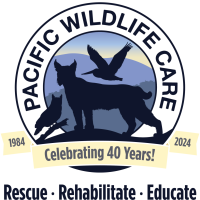We hope you find these FAQs helpful. If you have a question that’s not in this list, please submit using the form.
Submit Question
Send a question to Pacific Wildlife Care.
We hope you find these FAQs helpful. If you have a question that’s not in this list, please submit using the form.
Send a question to Pacific Wildlife Care.

Info
Follow Us
Our mission is to support San Luis Obispo County wildlife through rehabilitation and educational outreach.